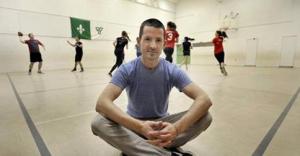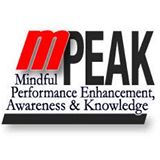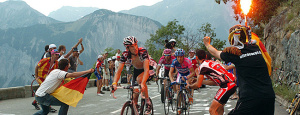 “Performance Enhancement” is a popular goal in my line of work that is typically associated with the supplement industry or return on investment (ROI) business strategies. Images are conjured up of competitive athletes in bright lycra crossing finish lines, a lone climber summiting a mountain with ice picks or people in suits shaking hands on big business deals. This is in stark contrast to images that come to mind when thinking about “mindfulness”. This ancient wisdom tradition inspires peaceful images of stacked stones, Zen gardens and people sitting with serene posture on beaches at sunset. So how exactly does Mindfulness fit with Performance Enhancement? Although seemingly opposites, research with the US Olympic BMX Cycling Team suggests that mindfulness practice actually has a lot to contribute to those aspiring to enhance their performance; and it’s not all beaches and sunsets.
“Performance Enhancement” is a popular goal in my line of work that is typically associated with the supplement industry or return on investment (ROI) business strategies. Images are conjured up of competitive athletes in bright lycra crossing finish lines, a lone climber summiting a mountain with ice picks or people in suits shaking hands on big business deals. This is in stark contrast to images that come to mind when thinking about “mindfulness”. This ancient wisdom tradition inspires peaceful images of stacked stones, Zen gardens and people sitting with serene posture on beaches at sunset. So how exactly does Mindfulness fit with Performance Enhancement? Although seemingly opposites, research with the US Olympic BMX Cycling Team suggests that mindfulness practice actually has a lot to contribute to those aspiring to enhance their performance; and it’s not all beaches and sunsets.
 Corporate leaders, extreme sports enthusiasts and everyday people who are looking for a competitive edge have been flocking to mindfulness training programs such as mPEAK, to help them cultivate presence, resilience and emotional regulation for greater success in work, sport and life. As a Mindfulness Based Health Coach I’ve been exploring this link between mindfulness and performance with my clients for the last decade. The path to improving performance is not always a straight one but there are several consistent themes that have emerged in my work.
Corporate leaders, extreme sports enthusiasts and everyday people who are looking for a competitive edge have been flocking to mindfulness training programs such as mPEAK, to help them cultivate presence, resilience and emotional regulation for greater success in work, sport and life. As a Mindfulness Based Health Coach I’ve been exploring this link between mindfulness and performance with my clients for the last decade. The path to improving performance is not always a straight one but there are several consistent themes that have emerged in my work.
Presence & Flow
When all of life’s circumstances align and conditions are just right; meaning you’re engaged in an inspiring and novel activity, you’re being challenged but feel competent and there is a degree of risk involved, you’re granted access to a deep state of presence called “flow”. According to positive psychologist Mihaly Csikszentmihalyi, flow, also known as “The Zone”, is the mental state of operation in which a person performing an activity is fully immersed in a feeling of energized focus, full involvement, and enjoyment in the process of the activity. In essence, flow is characterized by complete absorption in what one does. But how often does life offer us this perfect set of circumstances? When was the last time you found yourself in a state of flow? Occasionally you might find yourself naturally engaged in conversation, attentive to a project, deeply immersed in a book, hobby or sport. But what I’ve found in my practice is that people more often default into a state of distraction; they’re lost in thought, zoned out, ruminating, and mindless. In this state, peak performance and enjoyment are unavailable.
Luckily, it’s not necessary to passively wait for the perfect storm of conditions before you find yourself in flow. The specific mindfulness practices I teach my clients offers access to the present moment no matter what the external circumstances. With a blend of focused concentration, physical embodiment and a sense of allowing things to be as they are, mindfulness is a necessary and powerful precursor to experiencing flow. My clients and the participants of the mPEAK program are challenged to bring a sense of curiosity and a “beginners mind” to every moment, expanding the possibilities of experiencing flow in the high performance activities they’re involved in as well as in every day situations.
Emotional Regulation & Resilience
 Most of the people who seek my coaching are already pretty good at what they do and have had their fair share of successes. Their strengths and skills have gotten them far, but still they have a sense that something is holding them back from performing at their peak potential. Does this sound like you? There are times when it’s all coming together; you’re making consistent progress and seeing gains but then all of a sudden…SMACK! Life happens, right? You fumble the ball, pull a hamstring, miss a deadline, blow a deal, or worse. To add insult to injury, perhaps your temper flares and you say the wrong thing to the wrong person. Or maybe your pattern is to shut down and spiral into self-defeating thoughts. If so, you’re hardly alone; this happens to everyone at some point whether you’re a pro athlete or even a mindfulness professional! The reason we react to challenges this way is that our brain interprets these setbacks as a threat to our survival, which triggers the sympathetic nervous system’s fight/ flight reaction. With adrenaline and cortisol running through the veins; anger, blame, self-criticism and escapism are automatic, habitual reactions. These unconscious stress-driven reactions make the initial problem exponentially worse and lead to lower self confidence and higher stress levels.
Most of the people who seek my coaching are already pretty good at what they do and have had their fair share of successes. Their strengths and skills have gotten them far, but still they have a sense that something is holding them back from performing at their peak potential. Does this sound like you? There are times when it’s all coming together; you’re making consistent progress and seeing gains but then all of a sudden…SMACK! Life happens, right? You fumble the ball, pull a hamstring, miss a deadline, blow a deal, or worse. To add insult to injury, perhaps your temper flares and you say the wrong thing to the wrong person. Or maybe your pattern is to shut down and spiral into self-defeating thoughts. If so, you’re hardly alone; this happens to everyone at some point whether you’re a pro athlete or even a mindfulness professional! The reason we react to challenges this way is that our brain interprets these setbacks as a threat to our survival, which triggers the sympathetic nervous system’s fight/ flight reaction. With adrenaline and cortisol running through the veins; anger, blame, self-criticism and escapism are automatic, habitual reactions. These unconscious stress-driven reactions make the initial problem exponentially worse and lead to lower self confidence and higher stress levels.
What I’ve found is that life, work and sport will all offer consistent challenges but what separates the high performers from the rest, is how we respond to these challenges. For instance the best thing that ever happened for my sport and life was to rupture a disc in my lower back. You see, before facing the possibility of never running again, I took this body for granted. It wasn’t until I was faced with the pain of losing my identity as an athlete that I really began to understand what a gift it is to freely move and lift and play. Rather than let it stop me, this challenge eventually inspired me to levels of performance that far exceeded my original state. I’ve had clients with similar experiences of transformation after big events such as facing the loss of a business or a marriage. With a perspective based in mindfulness and self-compassion, these challenges can serve as the bell to finally awaken to our lives and our purpose.
In my practice, I’ve seen time and time again how mindfulness practice can lead to greater awareness of potential obstacles as well as more skillful decision-making; so the frequency of life smacking you down becomes less. And when life does inevitably deal you a rough hand, these practices can help you respond more skillfully, get up faster, turn challenges into practice opportunities and ultimately do less harm to yourself and others.
As the lead trainer of the upcoming 3-Day mPEAK Intensive this March, I’ll be teaching high performers from around the country how to pause and maintain a centered, balanced perspective and find resilience even in the face of challenges. With these new capacities for resilience and access to flow states, participants can begin to perform more consistently at their peak potential.
If you’re ready to sign up for the 3-Day mPEAK Intensive this March please click here. If you have any questions regarding the mPEAK program, please contact me at mpeak@ucsd.edu.
Perhaps someday in the future, when we think of mindfulness we’ll imagine athletes in uniform sitting with serene posture on playing fields and people in suits pausing silently before meetings. The more research that emerges, the more obvious it becomes that Mindfulness and Performance are truly on the same team.

